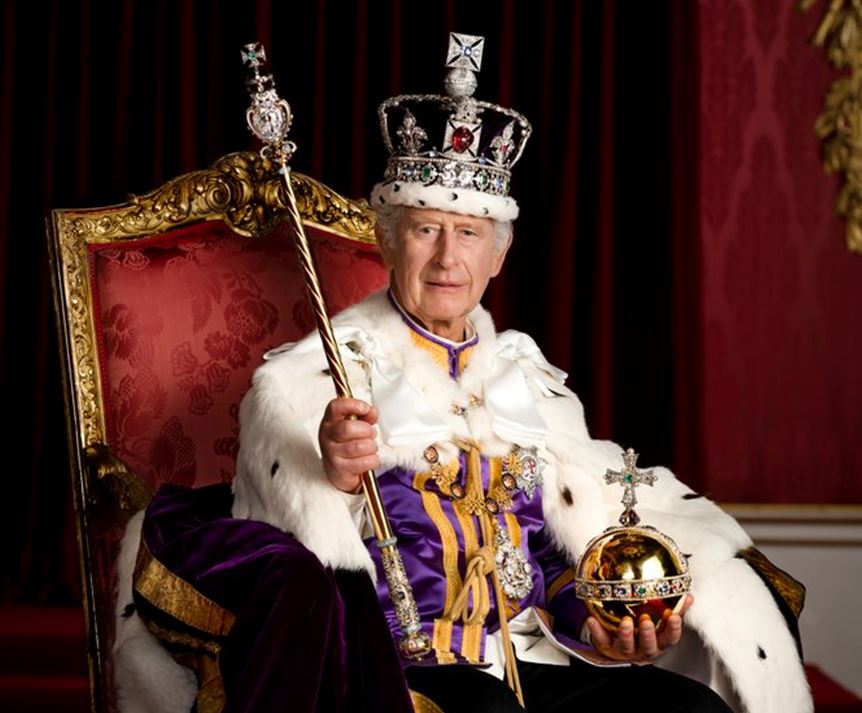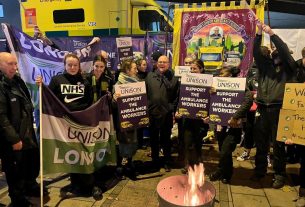The coronation arrests are a “direct attack on the fundamental rights of every person in the UK” say anti-monarchist group Republic.
CEO of Republic Graham Smith– one of six members of his group arrested and held by police before their protest against the monarchy began – said the arrests were a “direct attack on our democracy”.
The Metropolitan police expressed its “regret that those six people arrested were unable to join the wider group of protesters in Trafalgar Square and elsewhere on the procession route.”
Police issued a personal apology to Smith after no charges were brought against him. Smith said he did not accept the apology and that he will take legal action against them.
Police arrested 64 people on Saturday. This includes an NHS doctor who was arrested for wearing a Just Stop Oil t-shirt. Video of the arrest show Dr Kush Naker’s t-shirt was not even visible as he was wearing a zipped-up hoody when police led him away.
Smith has called for a full inquiry into who authorised the coronation arrests and gave a stark warning that the new Public Order Act – given Royal Assent by the King just days before his coronation – means the freedom to protest is now “contingent on political decisions made by ministers and senior police officers”.
He added: “These arrests have also destroyed whatever trust might have existed between peaceful protesters and the Metropolitan Police.”
Measures under the controversial Public Order Act – signed into law by the King just days before his coronation – include a ban on slow marching and six month prison sentences for protestors using “locking-on” tactics. Police also now have powers to arrest anyone they suspect may cause public nuisance.
UK editor for ITV News Paul Brand said the issue “isn’t really about the coronation now”, adding: “Take out the specific subject of the protest (monarchy) and replace with an issue you care about. Would you expect to be arrested for having a placard with your favoured slogan on it?”
Brand said there are “serious” questions about the “principle of policing by consent.”
“The right to protest peacefully in the UK no longer exists,” said Republic in a statement following the coronation arrests.
Shadow foreign secretary David Lammy suggested a Labour government would be too busy to repeal the Public Order Act, despite shadow attorney general Emily Thornberry calling it “draconian”.
Lammy said: “We can’t come into office, picking through all the Conservative legislation and repealing it,” he said. “It would take up so much parliamentary time.”
Labour’s response has been branded “spineless” by the SNP’s Chris Stephens while Green MP Caroline Lucas said Sir Keir Starmer’s party could “overturn this [law] in a day”, continuing: “If Labour isn’t going to stand up for fundamental human rights, then that is really chilling and we’re in a very serious place.”
Republic’s leader Smith told BBC Radio 4’s Today programme he has “absolutely no doubt at all” that the coronation arrests were premeditated by the police. Smith said he had liaised with Met police for four months leading up to the coronation, detailing the nature of Republic’s planned protest and receiving assurances from police that everything was in order.
However, Met police officers arrested Smith and his colleagues as they were taking placards out of a van under the “pretext” that the straps used to tie the placards together would be used for locking-on.
“The whole thing was a deliberate attempt to disrupt and diminish our protest,” said Smith. “They stopped us because the law was introduced, rushed in last week, to give them the powers to stop us on any flimsy pretext.”
TV personality and vocal critic of the government Carol Vorderman, tweeted: “Whether you’re pro/anti monarchy, this is hugely concerning Sunak backed arrests of people for non-violent protest who had had meetings with @metpoliceuk beforehand & their demo approved. Now the Met ‘regrets’ their arrests and has apologised”.
Two days before the coronation, some Labour MPs spoke out against the party’s rule changes to stop constituency branches affiliating with Republic.
The anti-monarchist group is one of 12 groups on a list sent out by Labour’s national executive committee (NEC) saying links with them are no longer valid and cannot be renewed without NEC approval.
“I can’t see that allowing local parties to participate in groups like these is going to bring down civilisation as we know it,” said former shadow chancellor John McDonnell.
“A form of institutional paranoia has emerged in the higher echelons of the party’s bureaucracy which has led to a level of control-freakery in relation to the activities of local CLPs which borders on farce.”
Another former shadow minister Clive Lewis said: “It feels wrong, and sits uncomfortably with me. I think a lot of people will find it problematic, even people who are going to be supportive of the coronation and the king.
“Many of them will also be people who believe in freedom of speech, freedom of expression and having an open, honest political debate about the future of this country.
“If you join the Labour party, you often joined because you want to make a difference to make your country better, and those are the kind of people who will want to ask questions about the kind of democracy we have.”
As well as Republic, the list includes Jeremy Corbyn’s newly founded Peace and Justice Project. The other ten proscribed groups are: the Palestine Solidarity Campaign, Labour Campaign for Nuclear Disarmament, Stop the War Coalition, London-Irish Abortion Rights Campaign, Jewish Voice for Labour, Somalis for Labour, Sikhs for Labour, All African Women’s Group, Health Campaigns Together, and the Campaign Against Climate Change Trade Union Group.




